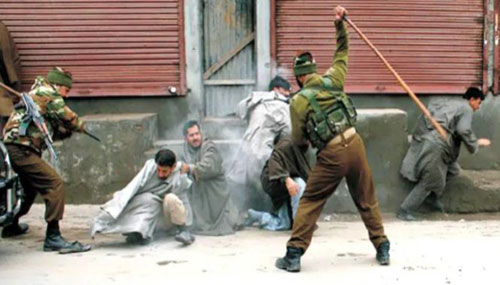Amnesty International in its annual Report 2021/22 slammed India for “putting human rights defenders at heightened risk of surveillance by” the Modi government agencies in occupied Jammu and Kashmir.
The report released by the Amnesty International said, “Residents of Jammu and Kashmir suffered the longest internet shutdown on record from 4 August 2019 to 5 February 2021.”
“The region continued to suffer repeated internet shutdowns over concerns for national security and public order. The shutdowns caused economic loss and adversely impacted education and other service provision. They also put human rights defenders at heightened risk of surveillance by government agencies.”
Here is the text of Amnesty International annual report on situation of human rights in India: The authorities used repressive laws to silence critics by curbing freedom of expression both offline and online. Human rights defenders, including activists, journalists, students, lawyers and actors, continued to face intimidation and harassment.
Independent investigations revealed a massive unlawful surveillance apparatus being used by the government against human rights defenders, violating their rights to privacy, non-discrimination and data protection. The foreign contribution law was misused to crack down on human rights NGOs. Police and security forces used excessive force against members of minority communities and farmers protesting peacefully against laws on farming. Courts undermined the right to a fair trial and delayed hearing crucial cases involving violations of human rights. In the context of Covid-19, lack of transparency over the distribution of funds increased and the right to health was undermined.
Significant sectors of the population suffered from shortages of hospital beds and oxygen during the second wave of Covid-19 infections. Caste-based discrimination and violence against Dalits and Adivasis continued unabated. Vigilante cow protection groups attacked minority communities, adversely affecting their livelihoods.
“Despite legislation in various states criminalizing acts of lynching, Dalit and Muslim men were assaulted or beaten to death by vigilante cow protection groups in Assam, Bihar, Jammu and Kashmir, Meghalaya, Rajasthan, Uttar Pradesh, Tripura and Uttar Pradesh.”
Unlawful and politically motivated restrictions were placed on freedom of expression and assembly. Outspoken journalists, media outlets, actors and human rights activists were threatened and intimidated through themisuse of over-broad financial laws.
On 28 July, multiple offices of the Dainik Bhaskar group, a Hindi-language news daily, were raided by tax authorities. Dainik Bhaskar had reported on the mass dumping of bodies of Covid-19 victims along the river Ganges due to high cremation costs.
Between 10 and 16 September, the offices of media outlets NewsClick and Newslaundry, as well as the house of actor-philanthropist Sonu Sood and the offices of human rights activist Harsh Mander, were raided on alleged charges of tax evasion and diversion of funds for “religious conversion”.
The Foreign Contribution Regulation Act(FCRA) was misused by government agencies to silence NGOs. In June, the Ministry of Home Affairs suspended the FCRA licence of the Commonwealth Human Rights Initiative, a human rights organization working on access to information and justice. The Ministry also cancelled the registration of10 international NGOs working on environment, climate change and child labour issues, and placed more than 80philanthropic and human rights agencies on a “Prior Reference Category” list without citing any reason. Funds are only disbursed to or from the organizations on this list after clearance from the Ministry of Home Affairs, curtailing their work.
In July the Pegasus Project, an international investigative journalism initiative, exposed the unlawful and arbitrary surveillance of Indian citizens through the government’s alleged use of Pegasus spyware. At least 300 telephone numbers of human rights defenders, journalists, lawyers, government officials and opposition politicians were potentially compromised. The spyware, as examined by Amnesty International, enabled government agencies to monitor all phone activity, including emails, files, contact lists, location information and chat messages. It also enabled governments to secretly record audio and video using a phone’s built-in microphone and camera. The ruling Bharatiya Janata Party (BJP) stalled all attempts by opposition leaders in parliament to initiate an investigation into the allegations.
On 27 October, the Supreme Court ordered the formation of a three-member committee to conduct an independent investigation into the use of Pegasus spyware for unlawful surveillance.
The names of many human rights defenders, including lawyers and academics, were added to the government’s Union War Book as “enemies of state” requiring “surveillance at all times”. The book is a colonial-era document which compiles information related to security threats.
In May, the government enforced the Information Technology (Intermediary Guidelines and Digital Media Ethics Code) Rules without the necessary public consultation and despite pending litigation in various courts. The Rules regulate so-called Over-the-Top (OTT) platforms such as television streaming services, as well as news media platforms. They allow for the blocking and censoring of content without any legislative backing. The introduction of the Rules also mandated the identification of the originator of certain information on social media, effectively breaking end-to-end encryption and violating the right to privacy. India witnessed 38 government-mandated internet shutdowns during the year.
Residents of Jammu and Kashmir suffered the longest internet shutdown on record from4 August 2019 to 5 February 2021. The region continued to suffer repeated internet shutdowns over concerns for national security and public order. The shutdowns caused economic loss and adversely impacted education and other service provision. They also put human rights defenders at heightened risk of surveillance by government agencies.
Fourteen human rights activists continued to be detained under the Unlawful Activities (Prevention) Act (UAPA) anti-terror legislation.










